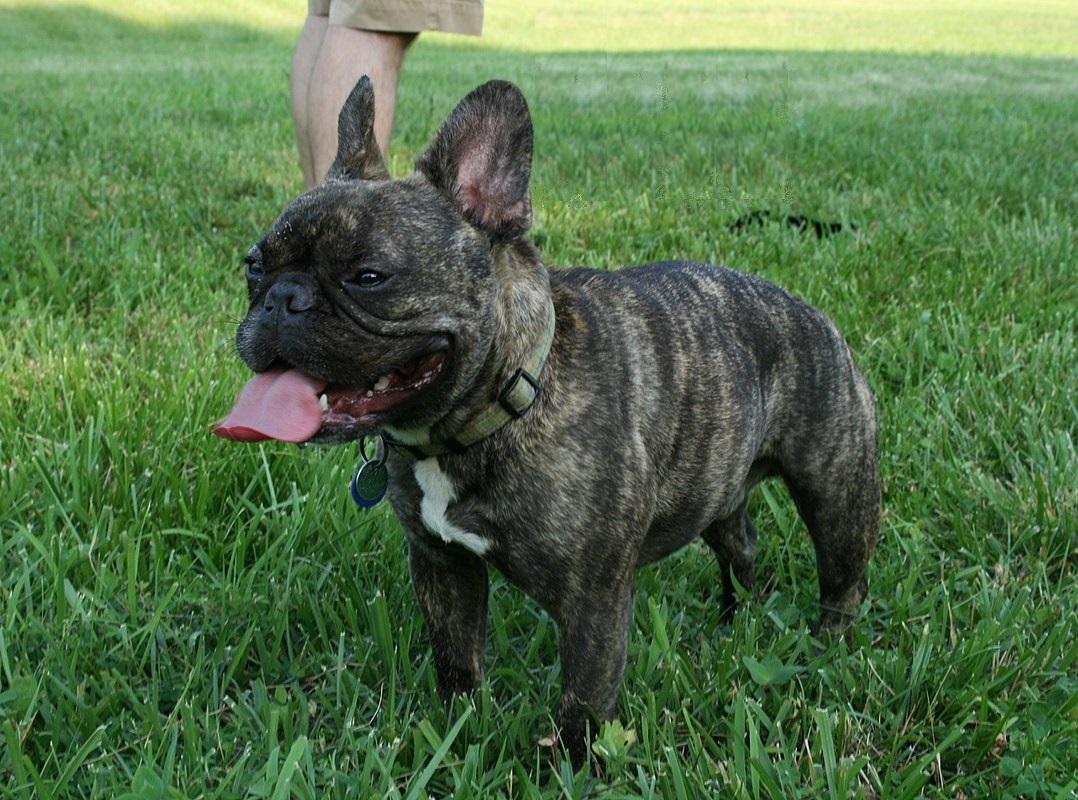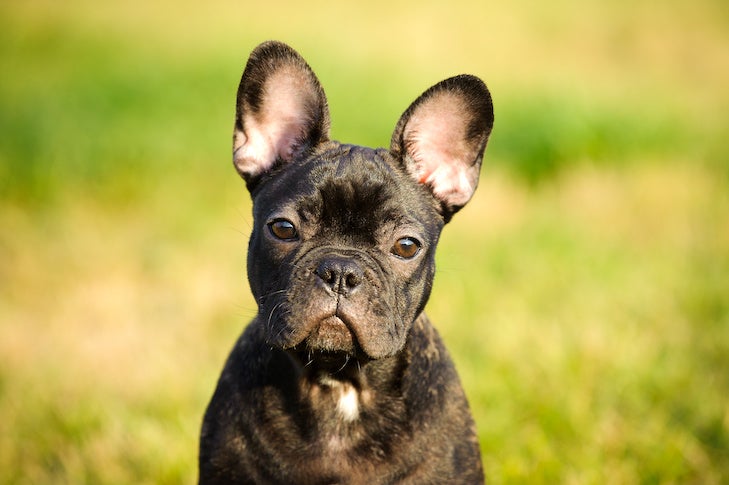When it comes to French Bulldogs, one surprising fact is that despite their name, they did not originate in France. Instead, these adorable dogs actually have their roots in England. So, if you’re wondering if a French Bulldog is purebred, you might find it interesting to know that their heritage lies across the English Channel.
French Bulldogs are indeed considered a purebred breed. They have a rich history that dates back to the early 1800s when they were bred as a smaller version of the English Bulldog. Known for their distinctive bat-like ears and friendly personality, these dogs have become highly sought after as companion pets. In fact, according to the American Kennel Club, French Bulldogs are currently the fourth most popular breed in the United States. Their unique charm and lovable nature make them a favorite choice for families and individuals alike.
French Bulldogs can be purebred if they come from registered purebred parents and have proper documentation. To determine if a French Bulldog is purebred, you should check their pedigree and papers, which should show a lineage of purebred French Bulldogs. It’s essential to do your research and make sure you’re getting a reputable breeder to ensure the authenticity of the breed. Additionally, physical characteristics like the appearance and temperament can also help confirm if a French Bulldog is purebred.

Is the French Bulldog Purebred?
French Bulldogs are a popular and beloved breed of dog. However, there is often confusion surrounding their pedigree. Many people wonder whether French Bulldogs are considered purebred dogs. In this article, we will explore the origins of the French Bulldog breed and address the question of their purity.
1. The History of the French Bulldog
The French Bulldog originated in France during the 19th century and was initially bred as a companion dog. They are descended from English Bulldogs crossed with local French breeds. The breed was developed to create a smaller, more compact version of the Bulldog that was suitable for city living.
French Bulldogs gained popularity among French lace workers in Nottingham, England. When the workers returned to France, they brought their beloved dogs with them. The breed quickly became a symbol of the French bourgeoisie and gained recognition from various kennel clubs.
Throughout history, breeders focused on maintaining the distinct characteristics of the French Bulldog, including their unique appearance, temperament, and health. The breed has been carefully preserved and continues to be cherished by dog enthusiasts worldwide.
2. The Characteristics of a Purebred French Bulldog
A purebred French Bulldog possesses specific characteristics that set them apart from other breeds. To be considered purebred, a French Bulldog must meet the breed standard set by kennel clubs and breed organizations. Here are some of the key characteristics of a purebred French Bulldog:
- Compact and muscular build
- Distinctive bat ears
- Short coat with various color patterns
- Well-defined head and round, dark eyes
- Cobby body and straight legs
It’s important to note that while the breed standard provides guidelines for the appearance and structure of a purebred French Bulldog, it does not guarantee the health or quality of an individual dog. Responsible breeders prioritize the overall health and well-being of their dogs and adhere to ethical breeding practices.
3. Recognized Kennel Clubs and Breed Organizations
French Bulldogs are recognized by various kennel clubs and breed organizations around the world. These organizations establish breed standards, promote responsible breeding practices, and provide information and resources for French Bulldog owners and enthusiasts. Some of the well-known kennel clubs and breed organizations include:
- American Kennel Club (AKC)
- The Kennel Club (UK)
- Canadian Kennel Club (CKC)
- Fédération Cynologique Internationale (FCI)
- Australian National Kennel Council (ANKC)
Being recognized by these reputable organizations further confirms the status of the French Bulldog as a purebred breed.
4. The Importance of Responsible Breeding
Responsible breeding plays a crucial role in maintaining the purity and quality of the French Bulldog breed. Ethical breeders prioritize the health and well-being of their dogs and take steps to minimize the risk of hereditary diseases and genetic disorders. They carefully select breeding pairs based on their health, temperament, and adherence to breed standards.
By supporting responsible breeders, potential owners can ensure they are getting a purebred French Bulldog that has been bred with care and consideration for the breed’s future.
Are French Bulldogs Worth the Investment?
French Bulldogs are undeniably adorable and have a unique charm that attracts many potential owners. However, owning a French Bulldog comes with certain responsibilities and financial commitments. Here are some factors to consider before investing in a French Bulldog:
1. Initial Cost
French Bulldogs can be quite expensive to purchase, especially from reputable breeders who prioritize health and genetic testing. The price can vary depending on factors such as the pedigree, lineage, and breeder reputation. It’s important to be financially prepared for the initial cost of acquiring a French Bulldog.
2. Ongoing Expenses
French Bulldogs require regular veterinary care, vaccinations, and preventative treatments for fleas, ticks, and parasites. Additionally, they have specific dietary needs and may require specialized food to maintain their health. Potential owners should be prepared for the ongoing expenses associated with owning a French Bulldog.
3. Time and Commitment
French Bulldogs are known for their affectionate and sociable nature, and they thrive on human companionship. They require daily interaction, exercise, and mental stimulation. Prospective owners should be ready to devote time and attention to their French Bulldog.
It’s also worth noting that French Bulldogs may be prone to certain health issues, such as brachycephalic airway syndrome and joint problems. These conditions can lead to higher medical expenses and special care requirements. It’s essential to be aware of these potential health concerns and be prepared to address them if necessary.
4. The Rewards of Owning a French Bulldog
Despite the financial commitments and responsibilities, owning a French Bulldog can be incredibly rewarding. They are known for their playful and friendly nature, making them great companions for individuals and families alike. French Bulldogs are often described as affectionate, loyal, and good with children.
They are also relatively low-maintenance when it comes to grooming due to their short coats. Additionally, French Bulldogs have a unique appearance and distinctive personalities that set them apart from other breeds.
5. Considering Adoption
Another option to consider is adopting a French Bulldog from a rescue organization or shelter. Many loving and deserving French Bulldogs are in need of forever homes. Adoption fees are generally lower than buying from a breeder, and it provides an opportunity to give a second chance to a dog in need.
Regardless of whether you choose to purchase a French Bulldog from a breeder or adopt one, it’s crucial to do thorough research and ensure the well-being of the dog is the top priority.
In Conclusion
The French Bulldog is considered a purebred dog, with recognized standards and breed organizations supporting its pedigree. However, it’s important to differentiate between purebred status and responsible breeding practices. Potential owners should prioritize finding a reputable breeder or considering adoption from a rescue organization to ensure the health and well-being of the French Bulldog they bring into their lives.
Key Takeaways: Is French Bulldog Purebred?
- French Bulldogs are a purebred breed.
- They have specific characteristics that set them apart from other breeds.
- French Bulldogs have a distinct appearance, including a compact body and bat ears.
- The breed has a unique temperament, known for being affectionate and friendly.
- When getting a French Bulldog, it’s important to find a reputable breeder to ensure you’re getting a purebred.
Frequently Asked Questions
Here are some common questions about the purity of French Bulldogs:
1. Are French Bulldogs purebred?
Yes, French Bulldogs are a recognized purebred dog breed. They have a distinct appearance and specific breed standards that define their characteristics.
French Bulldogs are descendants of the English Bulldog and were selectively bred in France. They have a compact and muscular build, a distinctive “bat” ear shape, and a short, smooth coat.
2. How can I determine if a French Bulldog is purebred?
To determine if a French Bulldog is purebred, you should look for certain breed characteristics:
1. Appearance: French Bulldogs should have a stocky build, a short coat, and a distinctive “bat” ear shape. They typically have a brachycephalic (flat) face with a wrinkled forehead.
2. Pedigree: A purebred French Bulldog should have a documented pedigree that traces their lineage back to other purebred French Bulldogs. You can request to see the pedigree or ask the breeder for information about the dog’s lineage.
3. Can a French Bulldog be mixed with other breeds?
Yes, it is possible for a French Bulldog to be mixed with other breeds. However, when a French Bulldog is mixed with another breed, it is no longer considered a purebred French Bulldog.
Some popular French Bulldog mixes include the Frenchton (French Bulldog and Boston Terrier mix) and the Frenchie Pug (French Bulldog and Pug mix). These mixed breeds may have different physical and temperament traits compared to purebred French Bulldogs.
4. Are there any health concerns related to French Bulldogs being purebred?
While French Bulldogs are generally healthy, there are some health concerns associated with their breed, regardless of their purity. Some common health issues in French Bulldogs include brachycephalic airway syndrome, hip dysplasia, and allergies.
It’s essential to choose a reputable breeder who prioritizes the health and well-being of their French Bulldogs. Regular veterinary check-ups and a balanced diet are also necessary to keep a French Bulldog in good health.
5. Can I register a French Bulldog with a kennel club if it’s not purebred?
No, you cannot register a French Bulldog with a kennel club if it is not purebred. Kennel clubs, such as the American Kennel Club (AKC) or the United Kennel Club (UKC), only register purebred dogs that meet their breed standards.
If your French Bulldog is a mixed breed, you may be able to register them with a hybrid dog registry or participate in events and competitions specifically for mixed breeds.

How to Identify a Pure French Bulldog Puppy?
In summary, a French Bulldog can be considered purebred if it meets the breed standards set by kennel clubs. These standards include specific physical characteristics, temperament, and ancestry.
While there are some variations within the breed, such as different coat colors, a purebred French Bulldog will have parents that are also French Bulldogs and will exhibit the typical traits of the breed.
